entrevue
With Penelope Trunk : What's Up With Hypertext Writer Adrienne Eisen?
par Paule Mackrous
Cliquez sur les images pour voir les oeuvres
Qu'est-il advenu d’Adrienne Eisen, auteure de plusieurs hypertextes? Lorsqu'une artiste change couramment de nom, il devient difficile de retracer l'ensemble de son travail. Dans cette entrevue effectuée avec Peneloppe Trunk aka Adrienne Eisen, nous en apprenons un peu plus sur la vie et les motivations de l’une des pionnières de l’hypertexte. Les motivations poussant quelqu'un à changer de nom sont rarement liées à des explorations identitaires et artistiques, mais portent souvent en elles des questions de survie. Des hypertextes d’Adrienne Eisen à la compagnie Brazen Careerist de Penelope Trunk, cette entrevue met en scène les multiple facettes d’un être humain.

Names and identity
In a small text entitled “My real name is not Penelope Trunk”, we can read about the different names you have had in your life: Adrienne Roston, Adrienne Greenheart, Peneloppe Trunk and Adrienne Eisen.) Which one really feels like your name now and why? Do you still use all of them?
I use the name Penelope Trunk. I don’t like the name Adrienne because I was abused as a kid and it was a very bad childhood. To me the name Adrienne is for men and I hear my parent saying it. It’s like having a flashback when someone uses the name Adrienne. I just feel it was the right thing for me to take a different name, I didn’t know that until after I did it. Then, I just took Penelope just out of convenience because I’m so much more widely known as Penelope than Adrienne. And I just did it out of necessity, I’m a pretty practical person. In general, I need money. I make money pretty easily but I’m really bad with money. My overwriting thing usually is just how to earn money. I only changed my name to Adrienne Eisen because I had a big job and my company just forced me to change the name on the hypertexts. I only used the name Penelope Trunk ‘cause I got a writing job at Time Warner and they told me I had to have a name. At the end, it seems like an interesting journey of identity but it was not intentional, it was really as a mean for survival.
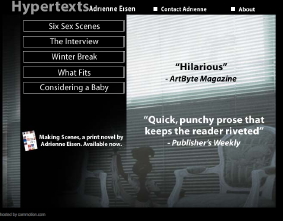
Novels and Hypertexts
You’ve been publishing your hypertext since 1993 on Adrienneeisen.com. How did this project, the whole website « Adrienne Eisen », come to mind?
Before the Internet was mainstream, there was something called CDI and I was dating a guy who was on a team. They try to find content for CDI. And people didn’t understand non linear, we had only done linear entertainment, not non linear entertainment. My boyfriend talked to me about it and I realized that everything I’ve been writing was actually non linear. So I said : “you should use what I write, that should be your content”. I could never get my writing published in print because it was non linear and print doesn’t do a good job of expressing that with your content. I already actually had the hypertext a lot of it written and I had no medium for showing it in. He introduced me to Internet because we needed to email each other back and forth, as we were doing long distance. He taught me how to use email. And then, I thought that I could code my own html and do it myself. I kept waiting for him to do it, he would not do it, then I coded my own html. Once you start coding yourself, you think more about the medium.
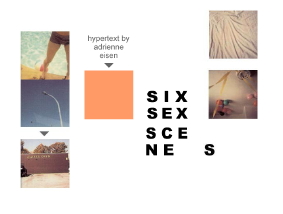
You then wrote the novel Making Scenes, exploring the relation in between hypertext and print. Tell me about that…
Well, I think memory is non linear, but the process of living a life is actually linear so I thought I could write a novel that is about living a life but uncovered how people feel with memory in their life. So it’s a combination of a non linear story line and a linear story line. I think when it comes to novel, I’m probably better at structure and discussion of structure than I am about story line. I’m not that good at a collapsic linear storyline. I would probably say my medium is more hypertext than novel.
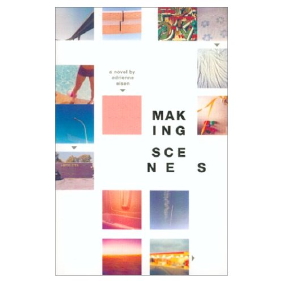
Career and bloging
You now have a company and a blog called Brazen Careerist, in which we can read « about your life » but « disguised as career advise ». I read it as an hypertext, but at the same time, I read it as real tips for my life and career. You blur the lines between your writing practice as an author and your career as someone who has a company named Brazen Careerist. Can you talk a little bit about this interrelation of the writer of six sex scene and the company owner?
Well it all comes back to me needing to make money. I think what I’m especially good at is dissecting conventions that most people don’t have to dissect because I have Asperger. There is a lot of conventions in the work place that I had to learn in a different way then everyone else because I can’t just pick it up. As someone with Asperger, I had to be taught to say “hi, how are you?” It’s not… it seems absolutely crazy to me actually and the therapist made me say it. Because of Asperger, I had to learn workplace conventions very carefully and I had to learn sexual in courtship conventions very carefully. I mean, if you think about it, the process of having sex is actually very similar to the process of saying “Hi how are you, oh I’m fine, How are you, what I’ve you been doing, did you see this person, yes I did.” To me is the exact same : “so tell me about yourself, what have you done in the last three years, why did you leave your last job?, what are your strengths and what are you weaknesses?”, these are all the same conversions to me. It makes sense to me that I would be writing about all of them at the same time, job conventions and sexual in courtships. My strength and the link, in between writing fiction just as in writing for my company, is probably dissecting things that we all do but we don’t think about that much.
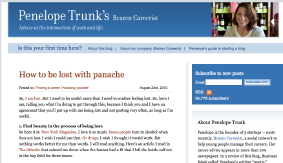
In your blog Brazen Careerist, you say « What I think my life is about is figuring out how to find success at the intersection of work and life ». How are technologies integrated in that quest?
I’m not very good at making friends, making friends is hard for me. If I were like at a conference for how to get a better life, I would die. There would be just too many people. I’m actually pretty shy, I know people can’t believe it. I don’t really like to be the center of attention, so it would be hard for me to talk if there were a lot of people there an there were no rule for talking. I can talk very well if I’m getting a speech and everyone is going to listen to me and I’m in a structure. An unstructured group conversation, I can’t cope with that. It’s very hard to learn from other people if you can’t deal with unstructured conversation. The blog is a way to participate in an unstructured conversation about things that I need help from other people like the intersection of career and work. I don’t have to deal with all the things that I’m bad at.
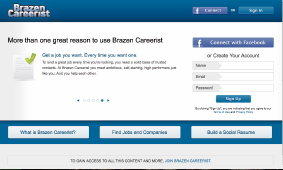
You insist a lot on the fact that ideas are very important, more than the experience, when you advise people on how to make their profile on Brazen Careerist. if you give your ideas away on the Web, how would someone be interested in hiring you? Do you believe we can really own our ideas on the Web?
If you think about it, people are in for an interview. People screen you to make sure that you are qualified. They are not going to waste time talking to you. It’s factual, have you display competency to do this work. They don’t need to call you in the office to find that out. They need to call you in the office to find out what your personality is like and how you think. People would get hired on the personality and how they think. You have a wage up on people, ff you can display that very well online. It’s not very revolutionary concept, at least in the US, hiring is much more affective to a social media you just get a better match. All of the fortune 500 at this point uses social media to hire. Also there is a research from PEW, people who put their ideas online on either a blog or other kinds of conversational situations, those people earn more money, they advance faster at work and they have more control over their career. At this point, it’s not very controversial that you really need to show your ideas online. The question is how do you do it and how much do you do it. You can’t really compete, unless you have an online profile.
I think nearly few people have something truly new and interesting to say. A lot of people are trying to have something new and interesting to say. People do not listen when it’s not new and interesting. It’s actually very scary to put out a new idea If it’s truly new you don’t know if people are going to say that you are an idiot. I get called an idiot all the time. A lot of people are writing and exploring and trying to find a new idea. No one is listening to them cause it’s not a new idea. But that’s the world of writing, a lot of people are writing in the whole world and the novel competition in the whole world is pretty fierce. That’s the same of writing. I read two or three new blogs everyday. It’s such a pleasure to see a new idea when. I always leave a comment, because it’s just such a treat. If your feel like you are not listened to, your ideas suck. You have to find what you are good at talking about and people will listen to you.
Company owner and writer
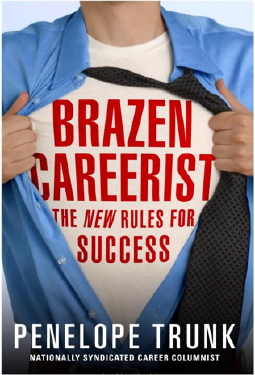
Does running that company feel like creating a fiction?
Running the company is very very hard. The start up is hard because you don’t know what the company is. We got millions of dollars to start this company based on the idea that we can figure out what the company was in a couple of years, really fast. It’s like writing cause you have to wake up everyday and do something and you don’t know where it will go. You are under pressure to get something done so you can eat. It’s very creative and it takes that crazy leap of faith that writers have. You probably noticed that, especially if you put it in a novel, everybody are like “Oh yes I want to write a novel too, I’m thinking of writing a novel next week” or “oh yes I’m going to be a writer too, next time I lose my job” everybody thinks they can write like it’s so easy and everybody want to do it. The same as doing a start up : “Oh yes, I’m really entrepreneurial too.” Both those lives are extremely scary, high risks, time consuming, usually they ruin your life The similarity is that it is obsessive, high risk, and creative.
 haut de page haut de page
 retour retour
|
